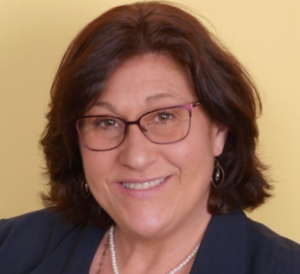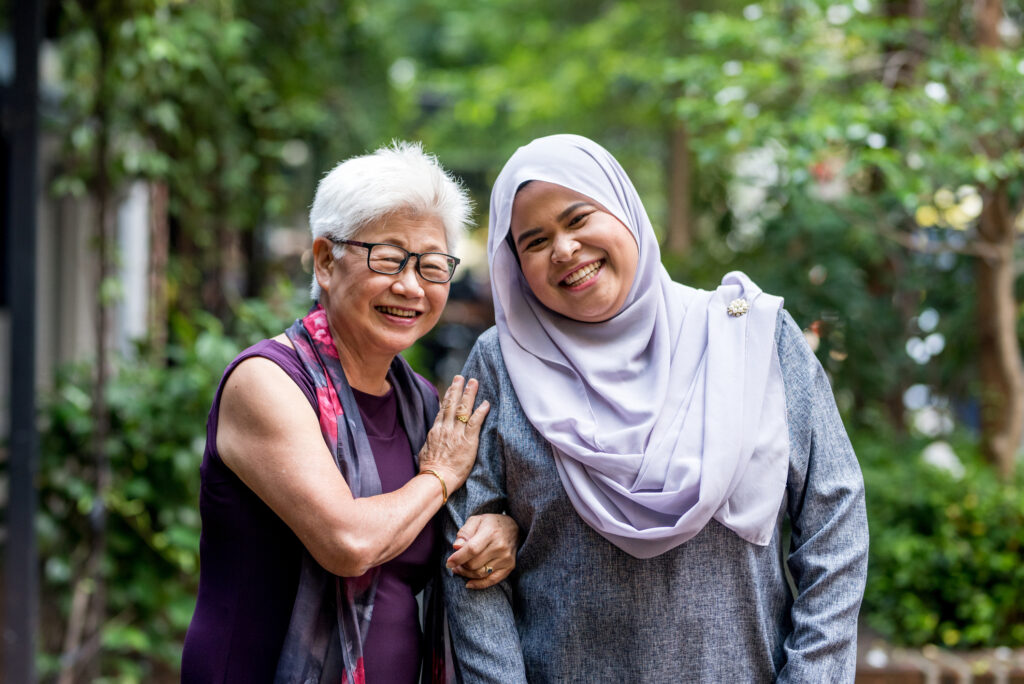
Wisconsin has a longstanding history of strong programs that provide support and services to caregivers in the state, and it has big plans for the future, as demonstrated in its 2023–2025 State Aging Plan. To learn more about Wisconsin’s caregiving initiatives, NASHP sat down with Lynn Gall. She is the manager of family caregiver support and lifespan respite programs at the Wisconsin Department of Health Services’ (DHS) Bureau of Aging and Disability Resources and Office on Aging and a newly sworn-in member of the RAISE Family Caregiving Advisory Council.
So far, what has been the impact of the National Strategy to Support Family Caregivers in Wisconsin, and what do you hope to bring to the work of the RAISE Council?
Our state efforts to support caregivers have been strengthened by the 2022 National Strategy to Support Family Caregivers and lessons learned during the COVID-19 pandemic. The COVID-19 pandemic highlighted the crucial role of caregivers in the health system overall and the necessity to update pre-COVID policies to increase access to services and supports. The National Strategy also deserves credit, as it brought national attention to family caregiving and presented key policy priorities to support family caregivers. As a RAISE Family Caregiving Advisory Council Member, I hope to bring my experience in Wisconsin to the council as it works to implement the actions of the National Strategy across the country.
How is caregiving incorporated into Wisconsin’s 2023–2025 State Aging Plan?
Caregiving is one of four identified priority topic areas in the plan, among COVID-19, home and community-based services, and equity. The state aims to focus on documenting best practices related to increasing caregiver support, strengthening and supporting the direct care workforce, implementing recommendations from RAISE Family Caregiving Advisory Council, and coordinating caregiving efforts with the Lifespan Respite Program and with the National Technical Assistance Center on Grandfamilies and Kinship Families.
The new plan also underscores the importance of caregiving to the health system through emphasis on coordinating caregiver support with employers and local communities, providing online training programs to caregivers and family caregiver support coordinators, and collecting data to track the impact of the state’s caregiving work.
The number of people with Alzheimer’s disease and related-dementias — who often depend on family caregivers — has grown rapidly with the aging of our society. What investments has Wisconsin made to support this population?
I am proud of the Dementia Care Specialist Program and the Alzheimer’s Family and Caregiver Support Program in Wisconsin.
Dementia Care Specialist Program
Beginning as a pilot program in select Aging and Disability Resource Centers (ADRCs) across the state, every ADRC and federally recognized tribe in Wisconsin now employs a dementia care specialist through the Dementia Care Specialist Program. These specialists work to improve the quality of life for people living at home with dementia and support their caregivers. Dementia care specialists at ADRCs and in tribal communities provide guidance, referrals to services, and information surrounding dementia-related topics like memory screenings, care planning assistance, and connection to support groups. They also work to implement local places like memory cafes and dementia-friendly businesses so that people with dementia can remain active and safe in their communities. The state provides funds to the ADRCs and tribes specifically to hire for these positions.
Alzheimer’s Family and Caregiver Support Program
Since 1985, Wisconsin has provided the state-funded Alzheimer’s Family and Caregiver Support Program (AFCSP) for individuals with Alzheimer’s or another type of irreversible dementia and for their families. AFCSP is available for individuals with a net income of $48,000 per year or less after subtracting costs of Alzheimer’s care from total income. AFCSP complements the National Family Caregiver Support Program that provides funds for supports for family and informal caregivers in every state. The Wisconsin Bureau of Aging and Disability Resources allocates AFSCP money to each county and tribe to provide caregiver supports and help caregivers buy services and goods to take care of someone with Alzheimer’s or another irreversible dementia, with funds up to $4,000 per member.
How else is Wisconsin supporting long-term care recipients and their caregivers?
Wisconsin is also working in other ways to support long-term care recipients and their family and informal caregivers. Additional programs, groups, or focus areas include:
- Independent Living Supports Project: Using American Rescue Plan Act funding, the Wisconsin DHS created a pilot program to offer supports to people who are not yet Medicaid eligible but at risk of entering Medicaid long-term care. The state hopes that this pilot will delay and/or prevent Medicaid enrollment, allow people to stay in their own homes for longer, and demonstrate cost savings to ensure the pilot’s expansion into a long-term service.
- Wisconsin Family and Caregiver Support Alliance (WFACSA): Created in 2017, WFACSA brings state agencies, advocacy groups, and families and caregivers with lived experience together to raise awareness of and increase access to family caregiver support and services in Wisconsin. WFACSA utilizes community collaboration and coordination to accomplish its goals.
- Lifespan Respite Care Program: Wisconsin DHS, in partnership with the Respite Care Association of Wisconsin and through funding from the Administration for Community Living, aims to expand and strengthen the availability and accessibility of high-quality and person-centered respite care for people of all ages in Wisconsin. When individuals reach funding or hour limits in care, Lifespan Respite can provide money to fill those gaps in care. The program also has enabled systems enhancements like emergency respite, training to in-home caregivers, and a provider registry.
What is the impetus behind the caregiving initiatives being implemented and sustained in Wisconsin?
The people — the variety of individuals and groups who champion caregiving issues and the collaboration between all of these people — make change happen. We credit Governor Tony Evers and his wife, Kathy Evers; the Wisconsin Family and Caregiver Support Alliance; employees in DHS and the governor’s office; advocates; caregivers; and care recipients for Wisconsin’s programs and progress.
To me, what makes the difference is that there are so many people who care about this. And how do you make that happen? I think it’s talking about it, and I think that’s starting to happen, in part, thanks to the National Strategy to Support Family Caregivers. It was happening here in Wisconsin already, but between COVID and the National Strategy, people are becoming more aware of how much we need family caregivers, how much they do, and how much they need support, and looking at new ways to do it.
To learn more about family caregiving and how states and other entities are working to support family caregivers, visit NASHP’s RAISE Act Family Caregiver Resource and Dissemination Center.
Acknowledgments
This work is generously supported by The John A. Hartford Foundation in collaboration with the U.S. Administration for Community Living.





